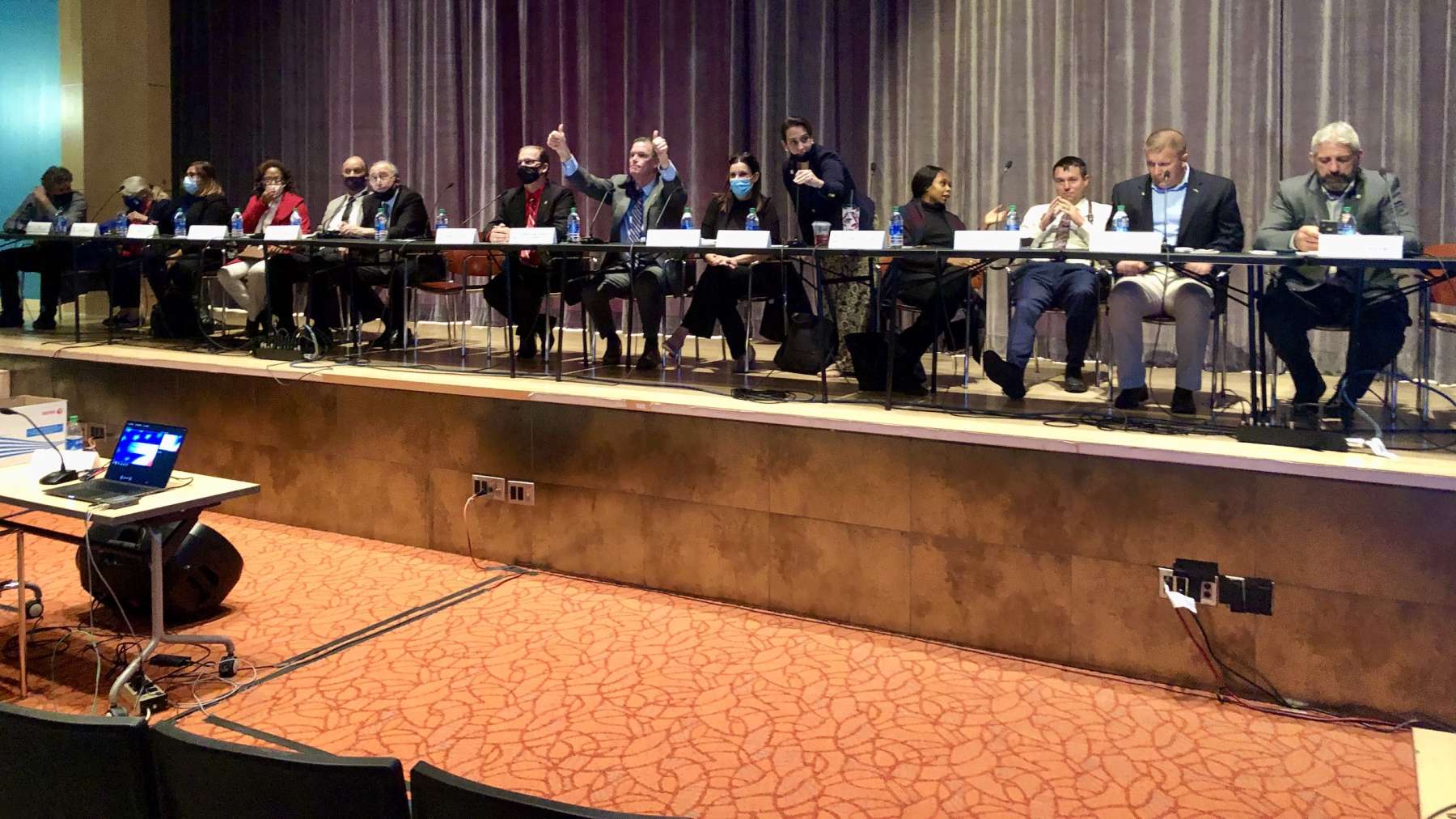If RI Redistricting fails to act within 8 days, racist prison gerrymandering will persist for 10 more years
The RI Redistricting Commission is on a time crunch. There are only two more hearings before these preliminary hearings end and Election Data Services takes a few weeks off to draw maps for commission approval. Once the maps are drawn, some changes can be made, but a major overhaul, such as ending prison gerrymandering, will be all but impossible.
October 20, 2021, 10:49 am
By Uprise RI Staff
Almost very meeting of the Rhode Island General Assembly’s Redistricting Commission has touched on the topic of prison gerrymandering. And the latest meeting held in Providence at the PCTA (Providence Career and Technical Academy) the issue blew up in a big way.
Prison gerrymandering is the process by which incarcerated people, who cannot vote, are counted for purposes of drawing districts. Under the law, each district should have roughly the same number of people, but by including prison populations in some districts, the number of voters a candidate must convince to vote for them drops appreciably. As noted by Providence College Political Science Professor Adam Myers at the September 23rd Redistricting Commission hearing, this causes the political strength of communities surrounding prisons to be “unfairly inflated,”, while the political strength of the communities from which these prisoners come are “unfairly diminished.” Given the racial makeup of our prison population, it’s plain to see that Black and brown neighborhoods in Providence, Pawtucket and Central Falls are the most negatively impacted, making this form of gerrymandering textbook systemic racism.
Under our present system of prison gerrymandering, Senate Districts 27 and 31 and House Districts 15 and 20, located in Warwick and Cranston, are the beneficiaries of a system that syphons political power from BIPOC communities. Moreover, every vote in these districts counts a little more than every other voter in the state, while “unfairly diminished” communities have votes that count a little bit less than every other voter in the state.
Under Rhode Island’s present system of prison gerrymandering, the concept of “one person, one vote” does not stand.
At the first hearing of the RI Redistricting Commission, Kimball Brace, Rhode Island’s outside expert on redistricting, called prison gerrymandering a “next decade” issue and said that since the General Assembly never dealt with the issue legislatively, there is nothing to be done but to redraw the maps as best we can to minimize the impact.
But commission member and [former] State Senator Harold Metts pushed back against this. While in office Metts had attempted to deal with this issue legislatively only to have the bill scuttled by [former] House Speaker Nicholas Mattiello, who, being from House District 15, was a direct beneficiary of racist gerrymandering. [Note that a majority of Democrats in the House fully supported Mattiello, electing him to the position of Speaker term after term despite this.]
However, despite pushing back verbally, Metts has made no motions while on the redistricting commission to deal with this issue.
Kimball Brace, and his firm Election Data Services, was hired by the Joint Committee on Legislative Services, which Mattiello chaired, to the tune of $615,000. Brace met routinely with Mattiello aid Leo Skenyon on the topic of redistricting, according to the Providence Journal.
At the commission meeting where Kimball Brace called prison gerrymandering a “next decade” issue, John Marion, from Common Cause Rhode Island, noted that the Pennsylvania redistricting commission addressed prison gerrymandering without legislative action.
Brace has also told the Redistricting Commission that ending prison gerrymandering will be difficult, because getting the records of where the currently incarcerated were living before their arrest and making the necessary changes to the census data will be time consuming, even if such data is made available. Never mind that the State of Pennsylvania was able to do so with a much larger prison population and Rhode Island maintains one facility, the Adult Correctional Institutions in Cranston. (The Wyatt, a private prison in Central Falls would also need to be reconciled.)
All of which bring us back to Monday’s hearing in Providence. [Former] State Senator Harold Metts told Ryan Taylor (subbing for Kimball Brace) that he wants more information on the impact of prison gerrymandering. Taylor said that the ACI does not provide home addresses for incarcerated people, but this is not exactly true.
The Rhode Island Department of Corrections (RIDOC) has an online, searchable database that lists the home city of every incarcerated person in the Rhode Island system. Though it does not provide a street address, to respect the privacy of the incarcerated, the RIDOC surely has this information and could provide it.
Many people spoke out about prison gerrymandering at Monday night’s commission hearing, including [former] State Representative Joseph Almeida, Andrew Poyant, Susan Feeley, Uprise RI and Joseph P Buchanon. Several commission members seem to be on board with the idea.
Ending prison gerrymandering will also bring our newly drawn district maps into compliance with state law. Under Rhode Island General Laws § 17-1-3.1. “A person’s residence for voting purposes is his or her fixed and established domicile… A person can have only one domicile, and the domicile shall not be considered lost solely by reason of absence for any of the following reasons: … Confinement in a correctional facility….”
In testimony before the House Judiciary Committee on March 6, 2018 on a bill to end prison gerrymandering, The Prison Policy Initiative writes, “The concentration of all Rhode Island’s state prisons into just one location in the state makes the problem of prison gerrymandering in the state’s legislative districts more significant than in almost any other state. In most states, prison gerrymandering affords a small number of districts with prisons 1%–5% more political influence than the residential populations of those districts actually warrant. Even in those states with this modest impact, prison gerrymandering is considered a serious ill that is to be avoided.
“By contrast,” continues the Prison Police Initiative, p”rison gerrymandering is a far larger problem in Rhode Island, where almost 15% of House District 20 is made up of incarcerated people from other parts of this state. This gives every group of 85 residents in this district the same influence as 100 residents in any other district.”
This testimony is well worth a read for those interested in the issue of prison gerrymandering.
If the RI Redistricting Commission doesn’t direct Election Data Services to do the necessary work, and doesn’t direct the RIDOC (and the Wyatt) to provide the information on the addresses of incarcerated people, ending prison gerrymandering before the year 2030 will not happen.
The RI Redistricting Commission is on a time crunch. There are only two more hearings – this Thursday (October 21) in Warwick and one more meeting on Monday (October 25) – before these preliminary hearings end and Election Data Services takes a few weeks off to draw maps for commission approval. Once the maps are drawn, some changes can be made, but a major overhaul, such as ending prison gerrymandering, will be all but impossible.
As I testified before the Commission on Monday, doing nothing now means sliding into ten more years of prison gerrymandering – racism by inaction.
So what can be done?
This Thursday (or Monday at the latest) a member of the commission must make a motion to direct Kimball Brace and Ryan Taylor of Election Data Services to correct the data and locate incarcerated people at their home addresses, not at the prison.
After the motion is made, a second member of the commission must second it.
The commission can then begin to debate the motion. All members of the commission would be free to voice their opinions for or against continuing prison gerrymandering in Rhode Island. The advantage of this to voters is that we will hear the issue openly debated, and we will know where the commission members stand. Knowing where the elected members of the commission stand on the issue of one person one vote and democracy in general is an important data point for voters.
The position of Election Data Services, that correcting prison gerrymandering now is too hard or impractical, must be disregarded. They are being paid $615,000 to assist Rhode Island in this process, not direct it. If Election Data Services cannot perform this task, the commission should find someone who can. Again, Pennsylvania did it. Other states are doing it. Of course Rhode Island can do it. It’s a matter of political will and moral bravery.
Rhode Island can end prison gerrymandering, but only if our Redistricting Commission takes immediate action. We have just eight days to act to prevent ten more years of racist prison gerrymandering.
Do the commission members care, and are they brave enough?
Here’s the video:







